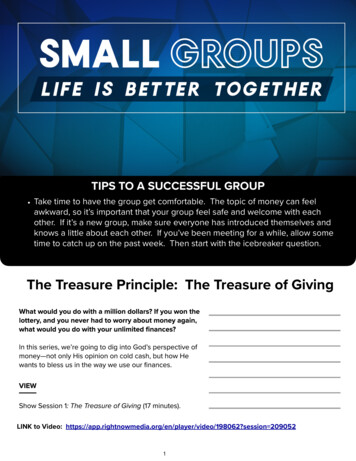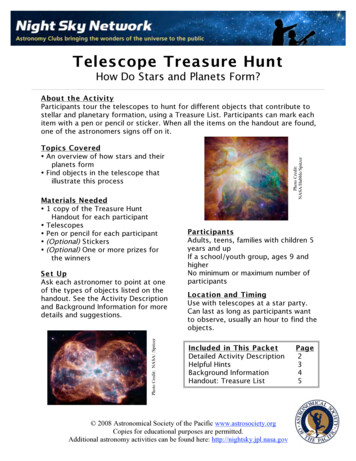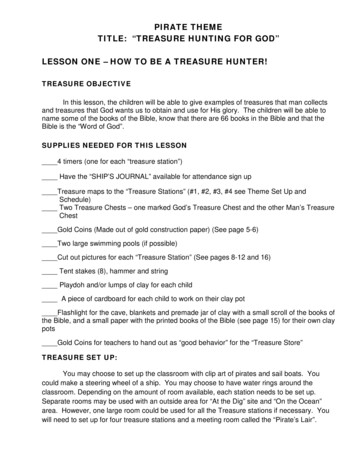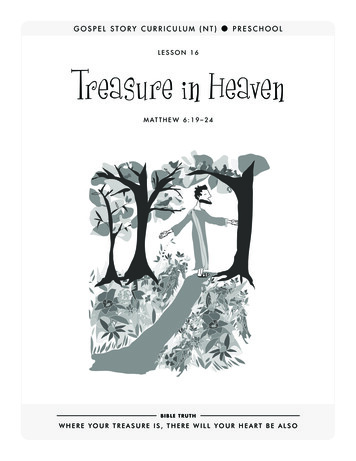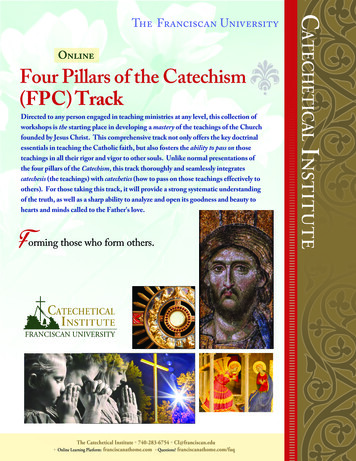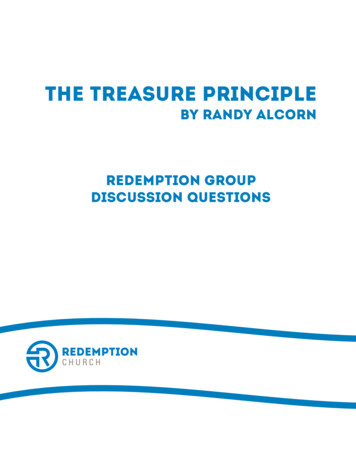
Transcription
The Treasure Principleby Randy alcornRedemption GroupDiscussion Questions
Chapter 1GETTING STARTED1. What is one gi. you have received that you especially appreciated? Why did it bring you suchjoy? A.er receiving such a gi., how did you feel toward the giver?DIGGING IN2. Is it significant that 15% of Christ’s teaching deals with money and possessions? Does thissurprise you? Why or why not? (9)3. Read MaMhew 6:19-21. In these verses, what are we commanded to do and what are wecommanded not to do?What is the logical argument that is presented by Jesus in these verses?4. What does the author mean when he describes your spending habits as “proof of your spiritualcondiTon”? (11) Do you agree?5. What does it mean to store up for yourself treasures in heaven? What are some ways we canstore up treasures in heaven? (15)LIVING IT OUT6. Several Tmes, this chapter speaks of our joy. “In his joy,” the man in Jesus’ story sold everythingto buy the field with the treasure in it (12). We are called to act in “enlightened self-interest”because it will bring us the greatest joy (16). Is it difficult for you personally to find joy ingenerosity? How might this teaching help?7. The Treasure Principle says: “You can’t take it with you, but you can send it on ahead”? (18) Doyou believe this to be true? Why or why not?
Chapter 2GETTING STARTED1. Have you ever lost a lot of money, lost a job, or faced a season when it was difficult to trust Godwith your finances? If so, what did you learn along the way?DIGGING IN2. Read each of the verses on page 24 — Psalm 24:1, Haggai 2:8, Deuteronomy 8:18, 1 Corinthians6:19-20. What do these verses communicate about how big God is?3. Treasure Principle Key #2 says, “God owns everything. I’m his money manager.” What does itmean that you are God’s money manager? What does a money manager do? (25)4. Alcorn says, “One of our central spiritual decisions is determining what is a reasonable amountto live on.” How much thought have you given to this “central spiritual decision”? (27)5. The Bible says, “God loves a cheerful giver.” What do you think of these remarks by Alcorn?“This doesn’t mean we should give only when we are feeling cheerful. The cheerfulness o:encomes during and a:er the act of obedience. So, don’t wait un l you feel like giving—it could bea long wait! Just give and watch the joy follow.” (28)6. Read 2 Corinthians 8:1-7. From these verses, make 5-7 observaTons about this real life story ofgiving.7. Alcorn says, “Our giving is a reflexive response to the grace of God in our lives.” (31) How doesreceiving God’s gi. of grace naturally moTvate us to give?LIVING IT OUT8. Alcorn writes, “ first and foremost, we give to God (2 Corinthians 8:5). Before anything else,giving is an act of worship.” (33) Do you regularly give with this mindset? Why or why not?9. Are their any personal beliefs, ajtudes, or acTons in your life that need to change to beMerenjoy the “abundance of joy” and the “privilege of parTcipaTng” in giving generously?
Chapter 3GETTING STARTED1. What is one gi. you have given that was incredibly fun to give (donaTon, birthday, anniversary,wedding, work bonus, met a need, etc.)? Why was this a significant experience for you? (39)DIGGING IN2. Jesus said, “Where your treasure is, there your heart will be also” (MaMhew 6:21). How is it thatour hearts are connected to our acTons?3. Treasure Principle Key #2 reads, “My heart always goes where I put God’s money.” (43) Why doyou think it is important to realize this truth?4. Read MaMhew 10:42. Have you ever considered that Jesus himself keeps a record of even yoursmallest acts of kindness? (39) How does this make you feel?5. On pages 38-41, Alcorn writes about the biblical idea of eternal rewards. What is one verse orstatement that resonated with you or rang true for you in this secTon? Were there any verses orstatements that made you pause or raised quesTons for you?6. What would be your first thought if you discovered that your child or your parents wereconsidering giving a large amount of money to a ministry or cause? How would you describeyour level of excitement? What counsel would you give them? (45)LIVING IT OUT7. An important secTon in this chapter states: “God wants your heart. He isn’t looking for ‘donors’for His kingdom, those who stand outside the cause and dispassionately consider acts ofphilanthropy. He’s looking for disciples immersed in the causes they give to. He wants people sofilled with a vision for eternity that they won’t dream of not invesTng their money, Tme, andprayers where they will maMer most.” How does this statement challenge you to grow as adisciple, or follower, of Jesus?8. What is one pracTcal step that you need to take to apply these truths in your own life?
Chapter 4GETTING STARTED1. Who in your family packs the most bags for a trip? Does this cause any family conflict? Do yourecall any especially funny stories related to this?DIGGING IN2. Treasure Principle Key #3 says, “Heaven, not earth, is my home.” Read the following verses aboutthis concept out loud: Hebrews 11:13-16, 2 Corinthians 5:20, Philippians 3:20. Have you everconsidered this understanding of “home” before? How might this shape our approach to life?3. Alcorn states, “We think we own our possessions, but too o.en they own us.” Have you everexperienced this feeling? What does this look like—especially in terms of demanding our energyand aMenTon? (54)4. React to the following statement: “Nothing makes a journey more difficult than a backpack filledwith nice but unnecessary things. Pilgrims travel light.” What does it pracTcally mean to “travellight?” (53)5. God’s money has a higher purpose than our affluence, but we o.en seek an affluent lifestyle tofeel significant. What are some ways to live differently in this regard?LIVING IT OUT6. Treasure Principle Key #4 says, “I should live not for the dot but for the line” (51). If you woke uptomorrow morning and prayed, “Lord help me to live for the line instead of the dot today,” howwould your day be different?7. Treasure Principle Key #5 says, “Giving is the only anTdote to materialism” (51). Do you viewmaterialism as a deadly poison you are desperately seeking an anTdote for? Why or why not?How does giving combat materialism? (57)8. The author writes: “Giving is a joyful surrender to a greater person and a greater agenda. Givingaffirms Christ’s lordship. It dethrones me and exalts him.” (59) In your experience, how doesgiving take your eyes off of self and focus your aMenTon on God?9. What is one takeaway from this chapter than you want to implement this week?
Chapter 5GETTING STARTED1. You are a having a conversaTon with a child who has a very short aMenTon span of 30 seconds.She asks, “How much are you supposed to give to church?” What is your answer?DIGGING IN2. Read the following verses and briefly summarize what each says about giving:Old TestamentLeviTcus 27:30 Proverbs 3:9 Malachi 3:8-10 Deuteronomy 16:17 New TestamentLuke 6:38 Acts 11:29 2 Corinthians 8:3 2 Corinthians 8:5 2 Corinthians 8:7 2 Corinthians 9:7 2 Corinthians 9:13 3. What are your thoughts on the three paragraphs that start with “Jesus validated the mandatoryTthe ” (62) and end with “ He never lowered it” (63)? Do you agree? Why or why not?4. Alcorn writes, “Tithing isn’t the ceiling of giving, it’s the floor. It’s not the finish line of giving, it’sjust the starTng blocks. Tithes can be the training wheels to launch us into the mindset, skills,and habits of grace giving.” (64) What point is the writer making?5. Read 2 Corinthians 8:3. What does this verse say about the role of faith in our giving? Is it everdifficult for you to go ahead and give when you are having to trust God to provide for your basicneeds?LIVING IT OUT6. Treasure Principle Key #6 says, “God prospers me not to raise my standard of living, but to raisemy standard of giving.” How does this contradict mainstream culture? How does that differ fromyour current viewpoint?7. What are some pracTcal things that might change if God truly got your first, not your last?Another way of saying this is: what would you do differently if you prioriTzed giving to Godrather than giving Him what’s le.over each month? (62)8. What would happen if an enTre church full of people lived with this perspecTve? How wouldthose outside the church see us? What impact might we make in our city and in our world?
Chapter 6GETTING STARTED1. Watch this scene from the movie Schindler’s List, which tells of one man’s heroic efforts to savepeople from the hands of Nazis - hMps://www.youtube.com/watch?v vOoWpTxKJGA. What dowe see in this scene about our tendency to misread the value of our possessions and how theymight be used for good?DIGGING IN2. Read Romans 12:8. Did you realize that one of the spiritual gi.s God gives to his people is thegi. of giving? As we’ve seen, all ChrisTans are called to generous giving, but some receive aspiritual gi: of giving that enables them to use their finances in combinaTon with their faith toadvance God’s mission. Why do you think we shy away from talking about this gi., while we arefine talking about others like the gi. of teaching, gi. of administraTon, gi. of mercy, etc?3. Why do you think we rarely discuss money as a part of our spiritual growth plans, spiritualdisciplines, and accountability, in spite of the fact that Jesus talked about it so frequently? (84)How might a redempTon group “spur one another on to love and good deeds” (Hebrews 10:24)in this area of our money?4. Read 1 Chronicles 29:6-9. Why is generosity so contagious and celebrated? Why is it necessaryfor some to lead the way in generosity? (86)LIVING IT OUT5. What does it mean to you personally to realize that you are part of a bigger desTny which God isworking out? If you knew that God had placed you in this church and in this city for such a meas this, how would it impact your giving? (87)6. Review the Treasure Principle and Keys on page 95. Which of the keys has most impacted youpersonally? Why?7. As you reflect on our study of generosity, what 3-5 takeaways do you want to remember?8. What next step or acTon step do you need to take to live out your takeaways? What Tmelineseems appropriate to complete that step? Who can help you meet that goal?“It is more blessed to give than to receive.” - Jesus
ADDITIONAL RESOURCES FOR GROWTHBUDGET AND FINANCESDave Ramsey is a well known speaker and coach on the topic of finances. Hiswebsite has some great tools for budgeTng, creaTng a debt reducTon plan, andgiving. hMp://www.daveramsey.com/Crown Ministries is a well known bible study on the topic of finances. Their websitehas some great tools for budgeTng, planning, and giving. hMp://www.crown.org/READING(in alphabetical order)Money, Possessions and Eternityby Randy AlcornDon’t Waste Your Lifeby John PiperRich Chris ans in an Age of Hungerby Ronald J. SiderFields of Godby Andy Stanley
6. Treasure Principle Key #4 says, "I should live not for the dot but for the line" (51). If you woke up tomorrow morning and prayed, "Lord help me to live for the line instead of the dot today," how would your day be different? 7. Treasure Principle Key #5 says, "Giving is the only anTdote to materialism" (51). Do you view


